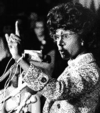
Timeline:
1970-90: Mayors, Congressmen, and Astronauts
| 1970 Baseball player Curt Flood, with the backing of the Major League Baseball Players Association, unsuccessfully challenges the reserve clause but begins its eventual demise. | ||
| 1971 Author Ernest J. Gaines publishes The Autobiography of Miss Jane Pittman, a fictional remembrance by an elderly black woman of the years between Reconstruction and the civil rights movement. | ||
 | 1971 Angela Davis is arraigned on charges of murder, kidnapping, and conspiracy for her alleged participation in a violent attempted escape from the Hall of Justice in Marin county, California, in 1970. | |
| 1971 In Swann v. Charlotte-Mecklenburg Board of Education the Supreme Court upholds the constitutionality of court-ordered plans to achieve desegregation of schools, affirming the busing of schoolchildren in Charlotte, North Carolina. | ||
| 1972 Writer Ishmael Reed publishes Mumbo Jumbo. Its irreverent tone successfully revives the tradition of the black satiric novel. | ||
 | 1972 Shirley Chisholm, a member of the House of Representatives from New York, is the first African American woman to make a serious bid for the U.S. presidency. | |
| 1973 Gladys Knight and the Pips produce a million-selling album Imagination, winning two Grammy Awards. | ||
| 1974 Baseball player Hank Aaron hits his 715th home run, breaking Babe Ruth's record, which had stood since 1935. | ||
| 1974 Actress Cicely Tyson is lauded for her role as the 110-year-old title character of the television drama The Autobiography of Miss Jane Pittman, which was adapted from the Ernest J. Gaines novel. | ||
| 1974 Boxer George Foreman, previously undefeated in professional bouts, falls to Muhammad Ali in eight rounds at Kinshasa, Zaire—the storied "Rumble in the Jungle." | ||
| 1974 Guinea-Bissau gains independence. | ||
| 1975 Playwright Ntozake Shange receives considerable acclaim for her theatre piece For Colored Girls Who Have Considered Suicide/When the Rainbow Is Enuf. | ||
| 1975 Tennis player Arthur Ashe wins the singles title at Wimbledon, becoming the first African American man to win the prestigious championship. | ||
| 1975 Elijah Muhammad, leader of the Nation of Islam, dies. After his son renames the organization and integrates it into orthodox Islam, Minister Louis Farrakhan reclaims and rebuilds the Nation of Islam. | ||
| 1975 Frank Robinson becomes the first African American manager of a Major League Baseball team, the Cleveland Indians. | ||
| 1975 Mozambique, Cape Verde, Comoros, São Tomé and Príncipe, and Angola gain independence. | ||
 | 1976 Barbara Jordan, congressional representative from Texas, delivers the keynote address at the Democratic National Convention, confirming her reputation as one of the most eloquent public speakers of her era. | |
| 1976 Congressman Andrew Young of Georgia becomes the first African American U.S. ambassador to the United Nations. | ||
| 1977 Alex Haley's Roots: The Saga of an American Family (1976) is adapted for television, becoming one of the most popular shows in the history of American television. | ||
| 1977 Benjamin L. Hooks becomes the executive director of the NAACP, succeeding Roy Wilkins. Stressing the need for affirmative action and increased minority voter registration, Hooks serves until 1993. | ||
| 1977 Djibouti gains independence. | ||
| 1978 In the Bakke decision (Regents of the University of California v. Bakke), the Supreme Court rules against fixed racial quotas but upholds the use of race as a factor in making decisions on admissions for professional schools. | ||
| 1978 Sociologist William Julius Wilson publishes The Declining Significance of Race, which maintains that class divisions and global economic changes, more than racism, created a large black underclass. | ||
| 1979 Lou Brock steals his 935th base, becoming Major League Baseball’s all-time career stolen-base leader. | ||
| 1979 United Steelworkers of America v. Weber permits an affirmative action program to privilege African Americans if the program is intended to remedy past discrimination. | ||
 | 1979 Singer and actress Cleo Laine is made an officer of the O.B.E. | |
| 1980 Robert Mugabe becomes prime minister of the newly independent state of Zimbabwe. | ||
| 1981 Civil-rights leader Andrew Young is elected mayor of Atlanta, Georgia, an office he holds through 1989. | ||
| 1982 Playwright Charles Fuller wins the Pulitzer Prize for drama for A Soldier's Play, which examines conflict among black soldiers on a Southern army base during World War II. | ||
| 1982 Singer Michael Jackson creates a sensation with the album Thriller, which becomes one of the most popular albums of all time, selling more than 40 million copies. | ||
| 1982 South African leader Nelson Mandela is transferred from Robben Island to a maximum security prison, where he will remain until his release in 1990. | ||
| 1983 Writer Alice Walker receives the Pulitzer Prize for The Color Purple. | ||
| 1983 Harold Washington wins the Democratic nomination by upsetting incumbent Mayor Jane Byrne and Richard M. Daley and is elected the first African American mayor of Chicago. | ||
| 1983 Civil-rights leader Jesse Jackson announces his intention to run for the Democratic presidential nomination, becoming the first African American man to make a serious bid for the presidency. | ||
 | 1983 Guion (“Guy”) Bluford, Jr., becomes the first African American in space as a member of the crew of the space shuttle Challenger. | |
| 1984 The Cosby Show, starring comedian Bill Cosby, becomes one of the most popular situation comedies in television history and is praised for its broad cross-cultural appeal and avoidance of racial stereotypes. | ||
| 1985 The Israeli government publicly confirms rumours that some 10,000 Ethiopian Jews (Falasha) have been secretly resettled in Israel beginning in 1977. | ||
| 1986 Playwright August Wilson receives the Pulitzer Prize for Fences, winning it again for The Piano Lesson in 1990. Both are from his cycle of plays chronicling the black American experience. | ||
| 1986 Established by legislation in 1983, Martin Luther King, Jr., Day is first celebrated as a U.S. national holiday. | ||
| 1987 Basketball forward Julius Erving, noted for his balletic leaps toward the basket and climactic slam dunks, retires after becoming the third professional player to score a career total of 30,000 points. | ||
| 1988 The South African government imposes a ban on all antiapartheid groups. | ||
| 1988 Runner Florence Griffith Joyner captures three gold medals and a silver in the Seoul Olympics. | ||
| 1989 Modern dancer Judith Jamison becomes the artistic director of the Alvin Ailey American Dance Theater, following Ailey's death. | ||
| 1989 David Dinkins becomes the first African American to be elected mayor of New York City. | ||
| 1990 John Edgar Wideman becomes the first author to twice receive the prestigious PEN/Faulkner Award for Fiction, for his novels Sent for You Yesterday (1983) and Philadelphia Fire (1990). | ||
| 1990 Author Walter Mosley publishes his first novel, Devil in a Blue Dress, which introduces the enduring character of "Easy" Rawlins, an unwilling amateur detective from the Watts section of Los Angeles in 1948. | ||
| 1990 Jazz drummer Art Blakey dies. Since founding the Jazz Messengers in 1954, he is responsible for nurturing generations of young jazz musicians, including Clifford Brown, Jackie McLean, and Lee Morgan. | ||
| 1990 Namibia gains independence. | ||

| Copyright © 2005 Encyclopædia Britannica, Inc. |